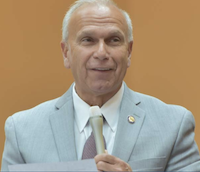The U.S. Supreme Court on Wednesday agreed to hear former President Donald Trump’s argument that he should be immune from criminal charges related to the 2020 election.
In a one-page order, the court set an expedited briefing schedule, with oral arguments to be held the week of April 22. Proceedings in the federal trial court will be on hold while the Supreme Court case is ongoing, further delaying the trial originally scheduled to begin March 4.
The Supreme Court will consider only the question of “whether and if so to what extent” a former president is legally shielded from official actions while in office.
Trump and his lawyers had asked the high court to pause pretrial activities in District of Columbia federal court for the case brought by U.S. Special Counsel Jack Smith that alleges Trump tried to overturn the results of the presidential election.
Smith, in his brief to the court, had asked justices to turn down the plea for a delay, saying a speedy trial is in the public interest. The claims of absolute presidential immunity and protection under the impeachment clause raised by Trump, now the GOP presidential front-runner, lack the merit needed for the justices to grant a stay, Smith said.
GOP attorneys general weigh in
The Republican attorneys general of 22 states filed a brief to the court Feb. 16 endorsing Trump’s request for a delay.
Led by Alabama, the group of GOP states said Smith’s effort to hasten a trial appeared to be politically motivated to damage President Joe Biden’s likely opponent in November’s election.
“Contrary to the prosecution’s haste, the fact that the defendant is a former President is a reason to move carefully—to be sure the prosecution is constitutional from inception,” they wrote. “And the fact that the defendant is potentially a future President is even more reason to ensure the appearance and reality of fairness.”
The states represented in the brief are Alabama, Alaska, Florida, Idaho, Indiana, Iowa, Kansas, Kentucky, Louisiana, Mississippi, Missouri, Montana, Nebraska, North Dakota, Ohio, Oklahoma, South Carolina, South Dakota, Texas, Utah, West Virginia and Wyoming.
Trump’s district court trial has been postponed indefinitely while the presidential immunity arguments play out.
Charges against Trump
A four-count federal indictment last year after an investigation by Smith accused Trump of conspiring to subvert his 2020 reelection loss to Biden, eventually leading to the Jan. 6, 2021, attack on the U.S. Capitol.
For weeks after the election, he fed his supporters a stream of lies claiming that he won the election but was denied a second term by voter fraud, the indictment said. He worked with attorneys, a U.S. Department of Justice official and a political consultant to organize slates of false presidential electors in seven states Biden won to take the place of Biden electors and pressured Vice President Mike Pence to reject the legitimate electors, according to the indictment.
Late last year, Trump asked to dismiss the charges, saying he could not be prosecuted for any actions he took as president. U.S. District Judge Tanya S. Chutkan denied that claim, a ruling Trump appealed to the D.C. Circuit.
A three-judge appeals panel appointed by both Democratic and Republican presidents unanimously denied Trump’s request in a Feb. 6 opinion that found the former president’s arguments “unsupported by precedent, history or the text and structure of the Constitution.”
Trump then asked the Supreme Court to pause all proceedings in district court while he petitioned the appeals court to escalate his case to the full circuit and potentially the Supreme Court.
• • •• • •
This story is provided by Ohio Capital Journal, a part of States Newsroom, a national 501(c)(3) nonprofit. See the original story here.














